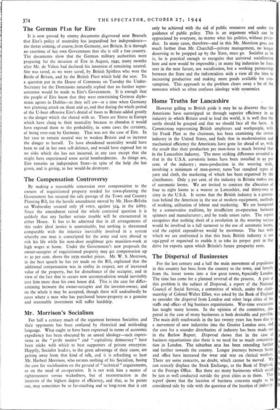The Dispersal of Businesses
For the last century and a half the main movement of population in this country has been from the country to the town, and latterly from thc lesser towns into a few great towns, especially London. The time has come for a planned reversal of the process. A part of this problem is the subject of Dispersal, a report of the National Council of Social Service, a committee of which, under the chair- manship of Colonel Walter Elliot, was asked by the Bank of England to consider the dispersal from London and other large cities of the staffs and offices of big business organisations. War-time evacuation has taught many lessons. In the opinion of the committee, dis- persal in the case of many businesses is both desirable and possible The main drift southwards in the last twenty years has been due to a movement of new industries into the Greater London area, and the case for a sounder distribution of industry has been made out in the Barlow Report. Dispersal shows that in the case of business organisations also there is no need for so much concentra- tion in London. The suburban area has been extending further and further towards the country. Longer journeys between home and office have increased the wear and tear on clerical workers. There are some concerns, no doubt, which cannot be moved. We can scarcely displace the Stock Exchange, or the Bank of England, or the Foreign Office. But there are many businesses which could be just as well conducted outside the great cities as in them. Tilts reporf shows that the location of business concerns ought to be considered side by side with the question of the location of industry


























 Previous page
Previous page